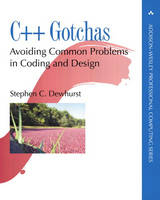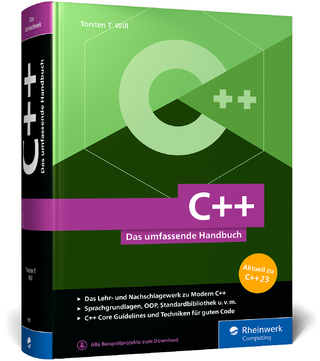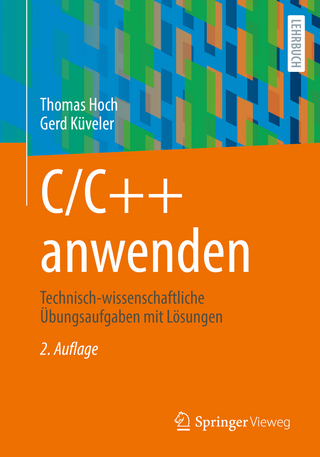
C++ Gotchas
Addison-Wesley Educational Publishers Inc (Verlag)
978-0-321-12518-7 (ISBN)
- Titel ist leider vergriffen;
keine Neuauflage - Artikel merken
C++ Gotchas is the latest addition to the distinguished roster of Addison-Wesley's bestselling programming titles, such as Effective C++ and Exceptional C++. While appealing to the same broad audience of intermediate C++ programmers, this book has a completely different approach. The author presents 99 "gotchas" - common and preventable problems in C++ programming and design. The gotchas run the gamut from minor syntactic annoyances to basic design flaws to psychological behavior. The material has been selected based on the author's extensive experience presenting gotchas in his training classes, speaking engagements, and magazine articles. By learning the lessons in this book C++ programmers will save themselves much time and wasted effort. C++ Gotchas is destined to become an invaluable reference to many programmers.
Stephen C. Dewhurst was among the first users of C++ at Bell Labs. He has more than twenty years of experience in applying C++ to problem areas such as compiler design, securities trading, e-commerce, and embedded telecommunications. He is the author and coauthor of several books on C++ and is a member of the advisory board for The C++ Source, a contributing editor for C/C++ Users Journal, and a former columnist for C++ Report. He is also the author of two C++ compilers and numerous articles on compiler design and C++ programming techniques. 0321125185AB02022005
Preface.
Acknowledgments.
1. Basics.
Gotcha #1: Excessive Commenting.
Gotcha #2: Magic Numbers.
Gotcha #3: Global Variables.
Gotcha #4: Failure to Distinguish Overloading from Default Initialization.
Gotcha #5: Misunderstanding References.
Gotcha #6: Misunderstanding Const.
Gotcha #7: Ignorance of Base Language Subtleties.
Gotcha #8: Failure to Distinguish Access and Visibility.
Gotcha #9: Using Bad Language.
Gotcha #10: Ignorance of Idiom.
Gotcha #11: Unnecessary Cleverness.
Gotcha #12: Adolescent Behavior.
2. Syntax.
Gotcha #13: Array/Initializer Confusion.
Gotcha #14: Evaluation Order Indecision.
Gotcha #15: Precedence Problems.
Gotcha #16: for Statement Debacle.
Gotcha #17: Maximal Munch Problems.
Gotcha #18: Creative Declaration-Specifier Ordering.
Gotcha #19: Function/Object Ambiguity.
Gotcha #20: Migrating Type-Qualifiers.
Gotcha #21: Self Initialization.
Gotcha #22: Static and Extern Types.
Gotcha #23: Operator Function Lookup Anomaly.
Gotcha #24: Operator — Subtleties.
3. The Preprocessor.
Gotcha #25: #define Literals.
Gotcha #26: #define Pseudofunctions.
Gotcha #27: Overuse of #if.
Gotcha #28: Side Effects in Assertions.
4. Conversions.
Gotcha #29: Converting Through void *.
Gotcha #30: Slicing.
Gotcha #31: Misunderstanding Pointer-to-Const Conversion.
Gotcha #32: Misunderstanding Pointer-to-Pointer-to-Const Conversion.
Gotcha #33: Misunderstanding Pointer-to-Pointer-to-Base Conversion.
Gotcha #34: Pointer-to-MultiDimensional Array Problems.
Gotcha #35: Unchecked Downcasting.
Gotcha #36: Misusing Conversion Operators.
Gotcha #37: Unintended Constructor Conversion.
Gotcha #38: Casting Under Multiple Inheritance.
Gotcha #39: Casting Incomplete Types.
Gotcha #40: Old-Style Casts.
Gotcha #41: Static Casts.
Gotcha #42: Temporary Initialization of Formal Arguments.
Gotcha #43: Temporary Lifetime.
Gotcha #44: References and Temporaries.
Gotcha #45: Ambiguity Failure of dynamic_cast.
Gotcha #46: Misunderstanding Contravariance.
5. Initialization.
Gotcha #47: Assignment/Initialization Confusion.
Gotcha #48: Improperly Scoped Variables.
Gotcha #49: Failure to Appreciate C++'s Fixation on Copy Operations.
Gotcha #50: Bitwise Copy of Class Objects.
Gotcha #51: Confusing Initialization and Assignment in Constructors.
Gotcha #52: Inconsistent Ordering of the Member Initialization List.
Gotcha #53: Virtual Base Default Initialization.
Gotcha #54: Copy Constructor Base Initialization.
Gotcha #55: Runtime Static Initialization Order.
Gotcha #56: Direct versus Copy Initialization.
Gotcha #57: Direct Argument Initialization.
Gotcha #58: Ignorance of the Return Value Optimizations.
Gotcha #59: Initializing a Static Member in a Constructor.
6. Memory and Resource Management.
Gotcha #60: Failure to Distinguish Scalar and Array Allocation.
Gotcha #61: Checking for Allocation Failure.
Gotcha #62: Replacing Global New and Delete.
Gotcha #63: Confusing Scope and Activation of Member new and delete.
Gotcha #64: Throwing String Literals.
Gotcha #65: Improper Exception Mechanics.
Gotcha #66: Abusing Local Addresses.
Gotcha #67: Failure to Employ Resource Acquisition Is Initialization.
Gotcha #68: Improper Use of auto_ptr.
7. Polymorphism.
Gotcha #69: Type Codes.
Gotcha #70: Nonvirtual Base Class Destructor.
Gotcha #71: Hiding Nonvirtual Functions.
Gotcha #72: Making Template Methods Too Flexible.
Gotcha #73: Overloading Virtual Functions.
Gotcha #74: Virtual Functions with Default Argument Initializers.
Gotcha #75: Calling Virtual Functions in Constructors and Destructors.
Gotcha #76: Virtual Assignment.
Gotcha #77: Failure to Distinguish among Overloading, Overriding, and Hiding.
Gotcha #78: Failure to Grok Virtual Functions and Overriding.
Gotcha #79: Dominance Issues.
8. Class Design.
Gotcha #80: Get/Set Interfaces.
Gotcha #81: Const and Reference Data Members.
Gotcha #82: Not Understanding the Meaning of Const Member Functions.
Gotcha #83: Failure to Distinguish Aggregation and Acquaintance.
Gotcha #84: Improper Operator Overloading.
Gotcha #85: Precedence and Overloading.
Gotcha #86: Friend versus Member Operators.
Gotcha #87: Problems with Increment and Decrement.
Gotcha #88: Misunderstanding Templated Copy Operations.
9. Hierarchy Design.
Gotcha #89: Arrays of Class Objects.
Gotcha #90: Improper Container Substitutability.
Gotcha #91: Failure to Understand Protected Access.
Gotcha #92: Public Inheritance for Code Reuse.
Gotcha #93: Concrete Public Base Classes.
Gotcha #94: Failure to Employ Degenerate Hierarchies.
Gotcha #95: Overuse of Inheritance.
Gotcha #96: Type-Based Control Structures.
Gotcha #97: Cosmic Hierarchies.
Gotcha #98: Asking Personal Questions of an Object.
Gotcha #99: Capability Queries.
Bibliography.
Index. 0321125185T11072002
| Erscheint lt. Verlag | 9.12.2002 |
|---|---|
| Verlagsort | New Jersey |
| Sprache | englisch |
| Maße | 186 x 233 mm |
| Gewicht | 604 g |
| Themenwelt | Informatik ► Programmiersprachen / -werkzeuge ► C / C++ |
| ISBN-10 | 0-321-12518-5 / 0321125185 |
| ISBN-13 | 978-0-321-12518-7 / 9780321125187 |
| Zustand | Neuware |
| Haben Sie eine Frage zum Produkt? |
aus dem Bereich


